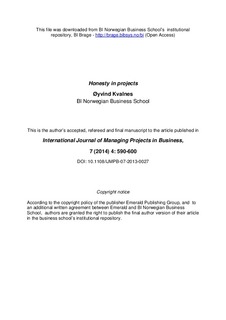Honesty in projects
Journal article, Peer reviewed

View/
Date
2014Metadata
Show full item recordCollections
- Publikasjoner fra CRIStin - BI [1015]
- Scientific articles [2181]
Original version
International Journal of Managing Projects in Business 2014, 7(4):590-600 10.1108/IJMPB-07-2013-0027Abstract
Purpose – The purpose of this paper is to explore how the concept of honesty can shed light on
misreporting issues in projects. Research on honesty can be useful for practitioners and researchers in
project management, in order to understand and counter the withholding and distortion of relevant
information from projects. In moral psychology, dishonesty is often explained as a result of moral
neutralization. The paper provides an account of how neutralization can lead to dishonesty in projects.
Design/methodology/approach – The current study is based on a literature review of research on
misreporting and dishonesty in projects, and of relevant generic studies of honesty.
Findings – The author concludes that the phenomenon of moral neutralization can explain dishonesty
and misreporting in projects. Honesty can be encouraged by identifying attempts at moral neutralization,
and rendering them unacceptable. At the core of this position is the view that the level of honesty
amongst project members is most adequately understood and explained from a circumstance rather than
a character approach.
Research limitations/implications – The paper is based on a literature review, and needs to be
supported by further empirical studies within project management.
Practical implications – The suggested primacy of a circumstance approach to honesty implies that
project practitioners should be aware of the phenomenon of moral neutralization. Even people of good
moral character can become involved in neutralization, in order to render misreporting acceptable.
The central practical challenge can thus be to recognize tendencies of neutralization in one’s own and
other people’s moral reasoning.
Originality/value – The main contribution of this paper is to introduce the concept of honesty in
general, and the concept of moral neutralization in particular, to project management research and
practice. The paper also suggests concrete ways to redirect attention from character to circumstances,
based on more general research findings in social and moral psychology.
Keywords Project management, Character, Virtue ethics, Honesty, Moral psychology
Paper type Research paper
Description
This is the author’s accepted, refereed and final manuscript to the article. Publisher's version is available at http://www.emeraldinsight.com/